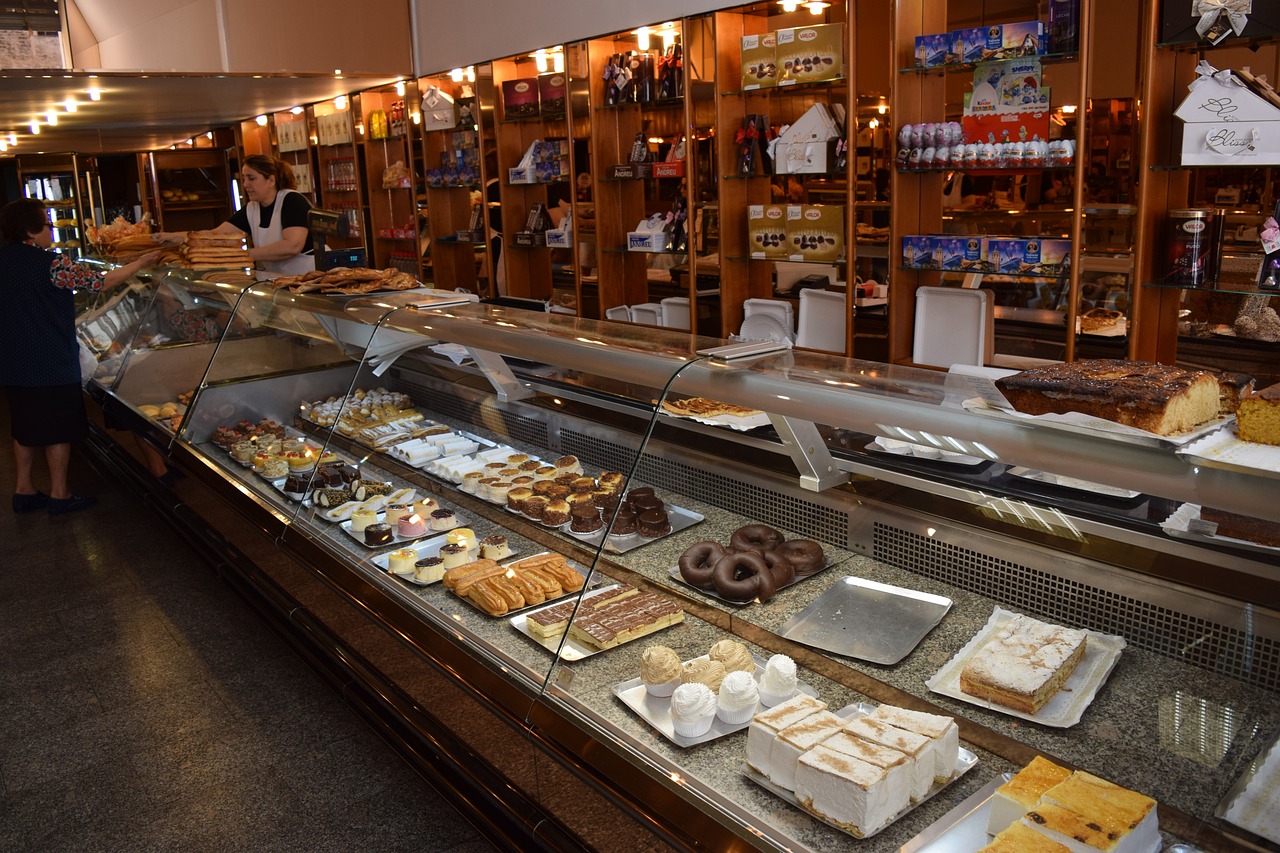Donut Shop For Sale Dallas : 5 Exciting Opportunities

Welcome to the enticing opportunity of acquiring a Donut Shop For Sale Dallas ! As the vibrant heart of Texas, Dallas boasts a thriving culinary scene, making it an ideal location for ventures in the food industry. In this article, we delve into the details of a Donut Shop for sale in Dallas, exploring the market landscape, financial considerations, strategic location selection, and essential steps for a successful transition. Whether you’re a prospective buyer seeking a profitable investment or a curious enthusiast eager to explore the world of donut entrepreneurship, this article offers valuable insights to guide you through the process. Let’s embark on this journey to discover the delectable world of donuts in Dallas.
Introduction to the Donut Shop For Sale Dallas :

Are you considering venturing into the world of entrepreneurship? Or perhaps you’re an established business owner seeking to expand your portfolio? Either way, the opportunity to acquire a donut shop in Dallas presents an exciting prospect.
Donuts, with their irresistible appeal and universal popularity, have long been a beloved indulgence for people of all ages. From classic glazed rings to innovative gourmet creations, the allure of freshly baked donuts transcends generations and cultural boundaries. As such, owning a donut shop can be both personally fulfilling and financially rewarding.
The decision to purchase a donut shop in Dallas is not one to be taken lightly. It requires careful consideration of various factors, including market demand, competition, location, and financial viability. However, for the right individual or investor with a passion for baking and entrepreneurship, it can be a fulfilling and lucrative endeavor.
Overview of the Donut Shop For Sale Dallas :

Dallas, with its dynamic economy and diverse population, offers a fertile ground for businesses in various industries, including the food sector. The donut industry in Dallas is no exception, experiencing steady growth and evolving consumer preferences. Understanding the landscape of the Dallas donut industry is essential for anyone looking to enter or expand within this market.
Market Trends and Demand: The demand for donuts in Dallas is driven by several factors, including population growth, cultural diversity, and changing consumer preferences. While traditional flavors remain popular, there is also a growing demand for gourmet and artisanal donuts made with high-quality ingredients and innovative flavors.
Competitive Landscape: The Dallas donut market is competitive, with a mix of independent bakeries, regional chains, and national brands vying for customers’ attention. Local favorites often distinguish themselves through unique offerings, personalized service, and community engagement, while larger chains leverage their brand recognition and marketing resources to attract customers.
Consumer Preferences: Understanding consumer preferences is crucial for success in the Dallas donut industry. While some customers prioritize convenience and affordability, others seek out premium products and a memorable dining experience. Catering to a diverse range of tastes and preferences can help donut shops attract and retain loyal customers.
Regulatory Environment: Like any business, donut shops in Dallas must comply with various regulations and health codes to ensure food safety and hygiene standards are met. Understanding the regulatory environment and obtaining necessary permits and licenses is essential for operating a successful and compliant donut shop.
Opportunities for Innovation: Despite the competitive nature of the industry, there are ample opportunities for innovation and differentiation in the Dallas donut market. Whether through unique flavor combinations, creative packaging, or innovative marketing strategies, donut shops can stand out from the competition and attract customers with a distinct brand identity.
Assessing the Value of the Donut Shop For Sale Dallas :
Before diving into the process of acquiring a donut shop in Dallas, it’s crucial to accurately assess its value. Understanding the financial health, potential for growth, and overall worth of the business is essential for making informed investment decisions. Here are key steps to effectively assess the value of a donut shop:
Financial Analysis: Start by conducting a comprehensive financial analysis of the donut shop. Review financial statements, including income statements, balance sheets, and cash flow statements, to gain insights into the business’s revenue, expenses, and profitability. Look for trends over time, identify any irregularities or discrepancies, and assess the overall financial health of the business.
Revenue Streams: Evaluate the various revenue streams generated by the donut shop, including sales from in-store purchases, online orders, catering services, and wholesale accounts. Determine the contribution of each revenue stream to the overall income of the business and assess their growth potential.
Customer Base: Analyze the donut shop’s customer base to understand its demographics, preferences, and purchasing behavior. Evaluate customer retention rates, frequency of visits, and average transaction size to gauge customer loyalty and the potential for future growth.
Market Position: Assess the donut shop’s position in the Dallas market relative to competitors. Consider factors such as location, brand reputation, product offerings, pricing strategy, and marketing efforts. Identify the donut shop’s unique selling propositions and competitive advantages that set it apart from other businesses in the industry.
Growth Opportunities: Identify potential growth opportunities for the donut shop, such as expanding the menu offerings, opening additional locations, increasing online sales, or tapping into new customer segments. Assess the feasibility and potential return on investment of each growth opportunity to determine its impact on the business’s value.
Assets and Liabilities: Take stock of the donut shop’s assets and liabilities, including inventory, equipment, lease agreements, debts, and obligations. Evaluate the condition and market value of assets, as well as any outstanding liabilities or financial commitments that may impact the business’s value.
Location Analysis: Choosing the Right Spot in Dallas
Selecting the ideal location for a donut shop in Dallas is paramount to its success. The right location can significantly impact foot traffic, visibility, accessibility, and ultimately, the profitability of the business. Here’s a detailed look at the key factors to consider when conducting a location analysis:
Demographics: Begin by analyzing the demographics of the surrounding area to understand the target market for the donut shop. Consider factors such as population density, age distribution, income levels, and cultural preferences. Choose a location that aligns with the demographics of the target customer base and offers the greatest potential for attracting and retaining customers.
Foot Traffic: Assess the volume of foot traffic in potential locations to gauge the visibility and exposure of the donut shop. High-traffic areas such as busy streets, shopping centers, office complexes, and tourist attractions offer greater opportunities for attracting customers and generating sales. Evaluate pedestrian patterns, proximity to public transportation, and nearby attractions or amenities that may drive foot traffic to the area.
Competition: Research the competitive landscape in the vicinity of potential locations to understand the level of competition and saturation in the market. Identify existing donut shops, bakeries, cafes, and other food establishments in the area and evaluate their offerings, pricing, and customer base. Choose a location with manageable competition and sufficient demand to support the success of the donut shop.
Accessibility: Consider the accessibility of potential locations for both customers and employees. Evaluate factors such as proximity to major roadways, parking availability, public transportation options, and ease of navigation. Choose a location that is convenient and easily accessible for customers from surrounding neighborhoods and business districts, as well as for delivery drivers and suppliers.
Zoning and Regulations: Ensure compliance with zoning regulations, licensing requirements, and other legal considerations when selecting a location for the donut shop. Research local zoning laws, health codes, signage regulations, and permit requirements to determine if the chosen location is suitable for operating a food service business. Consult with legal experts or local authorities to navigate any regulatory hurdles or zoning restrictions.
Cost Considerations: Evaluate the cost of leasing or purchasing real estate in potential locations, taking into account factors such as rent or mortgage payments, utilities, taxes, and operating expenses. Compare the cost of different locations relative to their potential for generating revenue and profitability. Factor in the projected sales volume, profit margins, and return on investment to determine the affordability and financial viability of each location.
Understanding the Financials: Revenue, Expenses, and Profitability

Before making the decision to acquire a donut shop in Dallas, it’s essential to have a clear understanding of the financial aspects of the business. Analyzing revenue, expenses, and profitability can provide insights into the financial health and potential of the donut shop. Here’s a detailed breakdown of each aspect:
Revenue Analysis: Begin by examining the sources of revenue for the donut shop, including in-store sales, online orders, catering services, and wholesale accounts. Review historical sales data to identify trends and patterns in revenue generation over time. Consider factors such as seasonality, special promotions, and events that may impact sales volumes. Evaluate the average transaction size, customer traffic patterns, and sales mix to gauge the overall revenue potential of the business.
Cost of Goods Sold (COGS): Calculate the cost of goods sold (COGS) to determine the direct costs associated with producing and selling donuts. This includes expenses such as ingredients, packaging materials, labor, and overhead costs directly attributable to the production process. Analyze the COGS as a percentage of revenue to assess the profitability of each product category and identify opportunities for cost optimization and efficiency improvements.
Operating Expenses: Evaluate the various operating expenses incurred by the donut shop, including rent, utilities, payroll, marketing, insurance, and administrative costs. Review historical expense data to identify recurring expenses and assess their impact on profitability. Analyze the operating expenses as a percentage of revenue to determine the overall cost structure of the business and identify areas for potential cost reduction or optimization.
Profitability Analysis: Calculate the gross profit margin and net profit margin to assess the overall profitability of the donut shop. The gross profit margin represents the percentage of revenue remaining after deducting the cost of goods sold, while the net profit margin reflects the percentage of revenue remaining after deducting all operating expenses. Compare the profit margins to industry benchmarks and historical performance to evaluate the profitability and financial viability of the business.
Cash Flow Analysis: Analyze the cash flow of the donut shop to understand its ability to generate sufficient cash to cover operating expenses, debt obligations, and capital expenditures. Review cash flow statements to track cash inflows and outflows over a specified period, identifying any cash flow bottlenecks or seasonal fluctuations. Evaluate the availability of working capital and assess the adequacy of cash reserves to support ongoing operations and future growth initiatives.
Financial Projections: Develop financial projections for the donut shop based on historical performance, market trends, and growth opportunities. Forecast future revenue, expenses, and profitability under different scenarios, such as expanding product offerings, entering new markets, or implementing cost-saving measures. Use financial modeling techniques to assess the impact of various factors on the business’s financial performance and make informed decisions about its future direction.
Equipment and Inventory Evaluation:
A crucial aspect of acquiring a donut shop in Dallas is assessing the equipment and inventory that come with the business. Proper evaluation ensures that the equipment is in good working condition and that inventory levels are sufficient to meet customer demand. Here’s a detailed examination of what to consider:
Equipment Assessment: Begin by conducting a thorough assessment of the equipment used in the donut shop’s operations. This includes machinery such as mixers, fryers, ovens, refrigerators, and display cases, as well as smaller tools and utensils needed for baking and serving. Inspect each piece of equipment for signs of wear and tear, damage, or malfunction. Verify that all equipment is properly maintained, regularly serviced, and compliant with safety regulations. Consider the age and condition of the equipment and assess the need for repairs, upgrades, or replacements to ensure smooth and efficient operations.
Inventory Analysis: Evaluate the current inventory levels of ingredients, supplies, and finished products on hand in the donut shop. This includes flour, sugar, eggs, flavorings, toppings, packaging materials, and any other items used in the production and sale of donuts. Compare inventory levels to historical usage patterns and sales volumes to identify any discrepancies or excess inventory that may need to be addressed. Check for expired or spoiled ingredients and assess the quality and freshness of perishable items to maintain product quality and minimize waste.
Supplier Relationships: Review the donut shop’s supplier relationships and procurement processes to ensure reliability, quality, and cost-effectiveness. Evaluate the terms of supplier contracts, pricing agreements, and delivery schedules to assess the impact on the business’s profitability and operational efficiency. Consider diversifying suppliers and sourcing alternative vendors to mitigate supply chain risks and reduce dependency on any single supplier. Negotiate favorable terms and seek opportunities to optimize procurement processes and streamline inventory management practices.
Storage Facilities: Assess the storage facilities available for housing equipment, ingredients, and inventory in the donut shop. Evaluate the layout, organization, and capacity of storage areas to ensure efficient utilization of space and easy access to essential items. Consider factors such as temperature control, humidity levels, cleanliness, and security measures to maintain product quality and prevent spoilage or damage. Implement proper inventory tracking and management systems to monitor stock levels, track expiration dates, and minimize inventory shrinkage or loss.
Regulatory Compliance: Ensure compliance with regulatory requirements related to food safety, hygiene standards, and storage practices when evaluating equipment and inventory in the donut shop. Verify that equipment meets sanitation guidelines and is properly maintained to prevent contamination and ensure product safety. Check that inventory storage areas are clean, pest-free, and organized according to regulatory standards. Train staff on proper food handling procedures and sanitation protocols to maintain compliance with health codes and regulations.
Donut Shop For Sale Dallas Conclusion
In conclusion, acquiring a donut shop in Dallas presents a promising opportunity for entrepreneurs and investors alike.
Through careful consideration of factors such as market trends, financial performance, location, equipment, and inventory, prospective buyers can make informed decisions and position themselves for success in the vibrant Dallas donut industry.
By leveraging insights from this comprehensive guide, aspiring donut shop owners can navigate the acquisition process with confidence, capitalize on growth opportunities, and build a thriving business that delights customers and contributes to the rich culinary landscape of Dallas.
With dedication, strategic planning, and a passion for baking, the journey into the world of donuts in Dallas is sure to be rewarding and fulfilling for those willing to embark on this exciting venture.
Frequently Asked Questions (FAQs) about Acquiring a Donut Shop in Dallas:
- What factors should I consider when assessing the value of a Donut Shop For Sale Dallas ?
- When assessing the value of a donut shop, it’s essential to consider factors such as financial performance, market trends, competition, growth opportunities, and regulatory compliance. Conducting a thorough evaluation of revenue, expenses, profitability, equipment, inventory, and location can provide insights into the overall worth and potential of the business.
- How do I choose the right location for a donut shop in Dallas?
- Selecting the ideal location for a donut shop involves evaluating factors such as demographics, foot traffic, competition, accessibility, zoning regulations, and cost considerations. Choose a location that aligns with the target customer base, offers high visibility and accessibility, and provides opportunities for growth and profitability.
- What should I look for when evaluating equipment and inventory in a donut shop?
- When evaluating equipment and inventory in a donut shop, look for signs of wear and tear, damage, or malfunction in equipment. Assess inventory levels, quality, and freshness of ingredients, and ensure compliance with food safety and storage standards. Consider supplier relationships, storage facilities, and regulatory compliance when assessing equipment and inventory.
- How can I assess the financial health and profitability of a donut shop in Dallas?
- To assess the financial health and profitability of a donut shop, analyze revenue, expenses, profit margins, cash flow, and financial projections. Review financial statements, calculate cost of goods sold (COGS), and evaluate operating expenses and profitability metrics. Develop financial projections based on historical performance and market trends to gauge future growth potential and profitability.
- What steps should I take to prepare for the acquisition of a Donut Shop For Sale Dallas ?
- Before acquiring a donut shop in Dallas, it’s essential to conduct thorough research, evaluate potential opportunities, secure financing, and seek professional advice from legal, financial, and business experts. Develop a detailed business plan, negotiate terms with sellers, and perform due diligence to ensure a smooth and successful transition.
- How can I differentiate my donut shop in the competitive Dallas market?
- To differentiate your donut shop in the competitive Dallas market, focus on offering unique products, personalized service, and memorable experiences for customers. Experiment with innovative flavors, creative packaging, and engaging marketing strategies to attract and retain loyal customers. Stay informed about market trends, listen to customer feedback, and adapt your offerings to meet evolving consumer preferences.
- What are some common challenges faced by donut shop owners in Dallas?
- Common challenges faced by donut shop owners in Dallas include intense competition, fluctuating demand, rising operating costs, regulatory compliance, and staffing issues. It’s essential to stay vigilant, adapt to changing market conditions, and implement strategies to overcome challenges and sustain long-term success in the competitive Dallas donut industry.
- How can I optimize operations and maximize profitability in my Donut Shop For Sale Dallas ?
- To optimize operations and maximize profitability in your donut shop, focus on improving efficiency, controlling costs, and enhancing customer satisfaction. Streamline production processes, minimize waste, and negotiate favorable terms with suppliers to reduce expenses. Invest in staff training, customer service initiatives, and marketing efforts to attract and retain customers, drive sales, and increase profitability.


